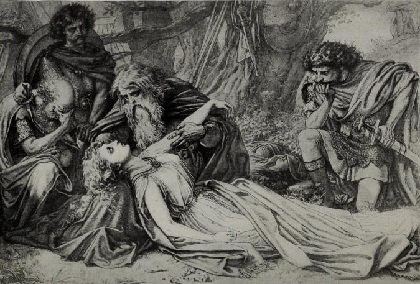|
|
King Lear: General Introduction
The epic tragedy, King Lear, has often been regarded as Shakespeare's greatest masterpiece, if not the crowning achievement of any dramatist in Western literature. This introduction to King Lear will provide students with a general overview of the play and its primary characters, in addition to selected essay topics. Studying a Shakespearean play deepens students' appreciation for all literature and facilitates both their understanding of themes and symbolism in literary works and their recognition of effective characterization and stylistic devices.
Dozens of versions of the tale of old Lear were readily available to Shakespeare and shaped the main plot of his own drama. However, it is clear that Shakespeare relied chiefly on King Leir, fully titled The True Chronicle History of King Leir, and his three daughters, Gonorill, Ragan, and Cordella, the anonymous play published twelve years before the first recorded performance of Shakespeare's King Lear. Exploring what changes Shakespeare made to the drama is an excellent way to gain a full understanding of King Lear.
How to cite this article:
Mabillard, Amanda. King Lear General Introduction. Shakespeare Online. 20 Aug. 2000. < http://www.shakespeare-online.com/plays/kinglear/kinglearintro.html >.
____
Related Resources
 King Lear: The Complete Play and Fast Facts King Lear: The Complete Play and Fast Facts
 King Lear: Analysis by Act and Scene King Lear: Analysis by Act and Scene
 Aesthetic and Textual Examination Questions on King Lear Aesthetic and Textual Examination Questions on King Lear
 Blank Verse in King Lear Blank Verse in King Lear
 King Lear Lecture Notes and Study Topics King Lear Lecture Notes and Study Topics
 The First Publication of King Lear The First Publication of King Lear
 The Fool in King Lear and his Function in the Play The Fool in King Lear and his Function in the Play
 The Shakespeare Sisterhood: Cordelia The Shakespeare Sisterhood: Cordelia
 The Condition of Lear's Mind The Condition of Lear's Mind
 Goneril: Physically, Intellectually, and Morally Goneril: Physically, Intellectually, and Morally
 Difficult Passages in King Lear Difficult Passages in King Lear
 Scene-by-Scene Questions on King Lear with Answers Scene-by-Scene Questions on King Lear with Answers
 King Lear Summary King Lear Summary
 King Lear Essay Topics King Lear Essay Topics
 King Lear Character Introduction King Lear Character Introduction
 Sources for King Lear Sources for King Lear
 Representations of Nature in Shakespeare's King Lear Representations of Nature in Shakespeare's King Lear
 King Lear: FAQ King Lear: FAQ
 Famous Quotations from King Lear Famous Quotations from King Lear
 Pronouncing Shakespearean Names Pronouncing Shakespearean Names
 Shakespeare's Language Shakespeare's Language
 Shakespeare's Metaphors and Similes Shakespeare's Metaphors and Similes
 Shakespeare's Reputation in Elizabethan England Shakespeare's Reputation in Elizabethan England
 Shakespeare's Impact on Other Writers Shakespeare's Impact on Other Writers
 Why Study Shakespeare? Why Study Shakespeare?
 What is Tragic Irony? What is Tragic Irony?
 Characteristics of Elizabethan Drama Characteristics of Elizabethan Drama
|

|
|
